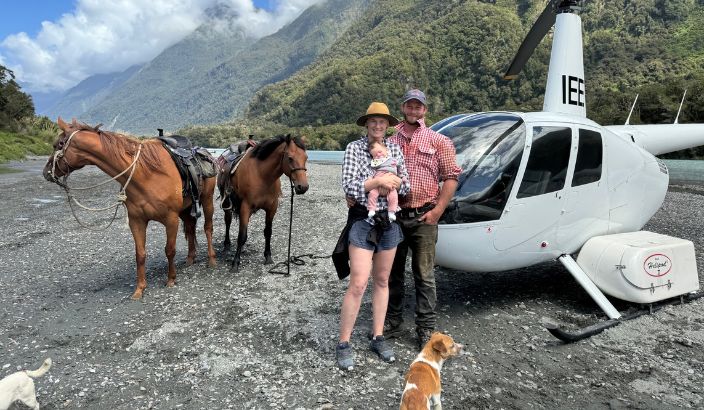Public land caretakers DOC need to allow low impact grazing


Simon Cameron, beef farmer from Haast with his partner Courtney and daughter Pippa. Photo: Supplied.
Tony Orman
A better approach by the Department of Conservation is needed to allow low impact livestock grazing on public lands the department administers, according to a West Coast farming leader.
South Westland farmer and West Coast Federated Farmers president Simon Cameron told the AGM of Marlborough Federated Farmers there are frustrations in the system of the granting of DoC grazing leases.
“The department has multiple layers of management,” he said. “Local DoC staff are good, and the department’s head office generally is too, but it’s middle management in the department’s management offices like Wellington, Hamilton, Dunedin, and so on, where there’s bureaucratic obstacles, roadblocks and delays. The middle layer of DoC is a cultural issue.” said Simon.
Simon is also Federated Farmers NZ Meat & Wool vice chair and farms in the Okuru, Turnbull, Waiatoto, Jackson, lower Arawata valleys in South Westland.
Apart from areas in South Westland, Simon cited the 78,00-hectare St James Station in the upper Waiau valley, Lewis Pass which was closed to farming in 2008 by the Labour government and now has a “massive weed problem. It should be extensively grazed, he said.
“Clarence Reserve is another case. Since the 1990s, when government started retiring large parcels of DOC-administered land under tenure review to ‘preserve’ it, we’ve gone backwards,” Simon said.
Managed grazing of the high country is synonymous with tourist appeal. “Merinos in the Mackenzie country, cattle in South Westland is part of the New Zealand high country way of life, certainly the opposite to monocultures of wilding pine spread such as at Tekapo, Marlborough and other places,” he added.
Late last year DoC launched consultation on proposals to improve its management of public conservation land. DoC has admitted the ways it currently handles land use leases concessions for tourism, and farming uses are “outdated”, “inefficient” and “burdensome”.
Simon says prior to tenure review, pest plants and wild animals on pastoral lease high country land were kept in check by the farmers who grazed cattle and Merino sheep in low numbers.
“Young farmers struggling to get their own farm could be leasing public lands for low impact farming experience,” he said.
However, DoC’s current system based on a 10-year lease with no right of renewal was nonsense as “no one in their right mind would invest in that.”
